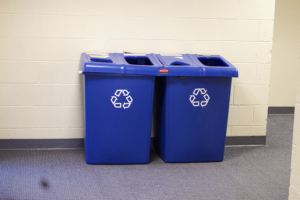
Residents of Washington, D.C. are now instructed to put clean pizza boxes and plastic cups in the recycling bin, not the trash.
Clean and empty pizza boxes, paper and plastic plates, cups, lids and to-go containers, which were previously considered garbage, are now recyclable in Washington, D.C, the District government announced Oct. 5.
The items can now be recycled by District residents as part of an ongoing initiative to reduce waste in the city. The change was announced by the Department of Public Works, the Department of Energy and Environment and the Department of General Services.
Washington residents living in single-family homes and residential buildings with fewer than three units are expected to recycle all items on the expanded list starting this month. D.C. businesses and multi-family homes are expected to follow the new recycling guidelines beginning Jan. 1, 2018.
The expansion of recycling in the city is aimed at taking a step toward achieving the District’s goal of diverting 80 percent of the city’s food waste by 2030. The expanded list of recyclables would reduce the amount of trash being sent to D.C.’s landfills, leading to a cleaner city overall, according to the initiative’s news release.
“Packaging waste occupies a significant amount of space in our landfills,” the news release read. “Recyclable and compostable alternatives, however, can be reconstituted into other useful products.”
Alejandro Kineen (SFS ’20), a member of Georgetown University’s Renewable Energy and Environmental Network, said the new recycling initiative in the city will make it easier for residents to understand what to recycle.
“A big thing in D.C., and in most big cities, is a lack of awareness many people have of recycling,” Kineen said. “Everyone wants to help out the environment, and it’s really not that hard to do it. It’s just that most cities don’t make a big effort teaching their people to recycle the right ways, and these initiatives help educate the common person to learn how to recycle.”
In addition to the new recycling initiative, the DPW announced the implementation of the District’s Zero Waste website, where D.C. residents can find answers to common questions about recycling. For example, dirty cardboard food containers cannot be recycled, nor can plastic cups that contain liquid.
Dan Guilbeault, the chief of the Urban Sustainability Administration’s Sustainability and Equity Branch for the DOEE, emphasized the benefits of a website solely dedicated to answering questions about recycling for D.C. residents in an Oct. 5 news conference announcing the initiative.
Throughout his time working at the DOEE, Guilbeault had received many questions from residents about what they could recycle. Guilbeault said that the answer frequently had been “it depends.”
“The whole ‘it depends’ answer, with a very complicated answer after that, is a pretty frustrating experience for everyone,” Guilbeault said at the press conference. “So it’s really beautiful to see that messaging getting so clear and so concise and having one place people can go to get all their questions answered.”
In the meantime, GREEN will continue to work to spread awareness about composting and recycling on campus.
“The goal of all of this, like the initiative that D.C. is taking right now and what Georgetown should be doing too, is basically making it easier to recycle,” Kineen said. “Because it’s not that hard; it’s just that people won’t do it if it requires a very large effort in their day.”




















